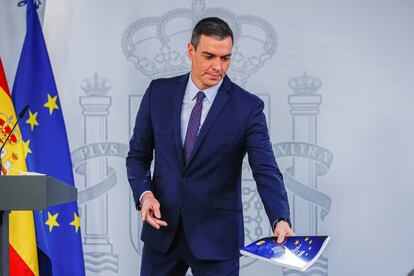Spain’s PM says €140bn in EU funds will deliver greatest economic transformation since the 1980s
Pedro Sánchez has unveiled the guidelines of a spending plan meant to pull the country out of the crisis caused by the coronavirus pandemic and help effect structural reforms

Spain’s Prime Minister Pedro Sánchez on Tuesday offered some insight into the way that €140 billion in European recovery funds will be spent in the coming years.
The leader of the Socialist Party (PSOE) guaranteed that the biggest public investment plan in recent history will modernize the Spanish economy more intensely than at any other time since the country joined the European Union in 1986, alluding to a transformational moment for a nation that was then emerging from 40 years of dictatorship and isolationist policies.
“This plan is the greatest opportunity for Spain since its admission into the EU,” said the prime minister in lofty tones meant to underscore the relevance of a project that he sees as the signature issue of his administration.
The pandemic will give way to a new period in our historySpanish PM Pedro Sánchez
Around half of the amount, €72 billion, will take the form of grants, while the rest will be paid out in loans. By comparison, in the 1980s Spain received €8 billion in European cohesion funds. While Sánchez did not go into too much detail – the plan is not the final one that will be sent to Brussels, which has given member states an April 30 deadline – he unveiled its main guidelines. Over the next six years, he said, Spain will undertake 102 reforms and 110 substantial investment projects.
Besides all the major reforms negotiated with the EU on labor, pensions, taxes, public administration, health, education, the justice system, the caregiving economy and water legislation, Sánchez said there will be investments worth €70 billion “that will have an immediate impact on jobs this year.”
Of that amount, 39% will be linked to the ecological transition and 29% to digital transformation. The numbers provide clues as to the scope of the public investment plan: €13.2 billion for a sustainable mobility strategy, €6.8 billion for a residential buildings renovation plan, €4.3 billion to streamline government agencies, €4 billion for the digitalization of small- and medium-sized businesses, and €4 billion to roll out 5G technology.
A new Marshall Plan
Central, regional and local governments will be largely in charge of spending the money, which authorities hope will pull the economy out of its current hole, consolidate long-term growth and upgrade an outdated productive model that has shown itself to be weak against the coronavirus crisis, as Sánchez himself admitted.
“In 2020, the negative effects of the ‘austericide’ became evident in the weakness of our welfare state,” said Sánchez, alluding to spending cuts enforced during the previous economic crisis that began in 2008. “We have learned that the real solution lies in undoing the mistakes of the past. The pandemic will give way to a new period in our history, as demonstrated by the great European Marshall Plan currently underway and which we always defended. It is the first step towards a new era of modernization and transformation.”
The Socialist leader, who heads a minority government with junior partner Unidas Podemos, will take the spending plan to the lower house of parliament on Wednesday – opposition groups have complained that they still don’t have a text detailing the proposals – and in the afternoon Economy Minister Nadia Calviño will discuss it with unions and employer groups.
While Sánchez boasted that some of the reforms requested by Brussels have already been implemented, especially those involving climate change, education and remote work, the trickiest ones have yet to be tackled. The partners in the executive have agreed to tweak parts of the labor reform introduced in 2012 by a Popular Party (PP) administration, and talks are already underway, although employer associations appear unconvinced so far.
On the sensitive issue of reforming the state pension system, an early proposal to extend the contribution period for pension eligibility to 35 years has been dropped, and on taxes, Sánchez said that “recovery comes first,” although reform remains in the pipeline.
“The European Commission is saying that Spain needs fiscal reform,” said Sánchez, finding support for his long-term plan in the international arena. “Even the dangerous Red communist Biden is talking about raising taxes, it is a worldwide debate,” he said ironically, in reference to US President Joe Biden.
English version by Susana Urra.
Tu suscripción se está usando en otro dispositivo
¿Quieres añadir otro usuario a tu suscripción?
Si continúas leyendo en este dispositivo, no se podrá leer en el otro.
FlechaTu suscripción se está usando en otro dispositivo y solo puedes acceder a EL PAÍS desde un dispositivo a la vez.
Si quieres compartir tu cuenta, cambia tu suscripción a la modalidad Premium, así podrás añadir otro usuario. Cada uno accederá con su propia cuenta de email, lo que os permitirá personalizar vuestra experiencia en EL PAÍS.
¿Tienes una suscripción de empresa? Accede aquí para contratar más cuentas.
En el caso de no saber quién está usando tu cuenta, te recomendamos cambiar tu contraseña aquí.
Si decides continuar compartiendo tu cuenta, este mensaje se mostrará en tu dispositivo y en el de la otra persona que está usando tu cuenta de forma indefinida, afectando a tu experiencia de lectura. Puedes consultar aquí los términos y condiciones de la suscripción digital.









































